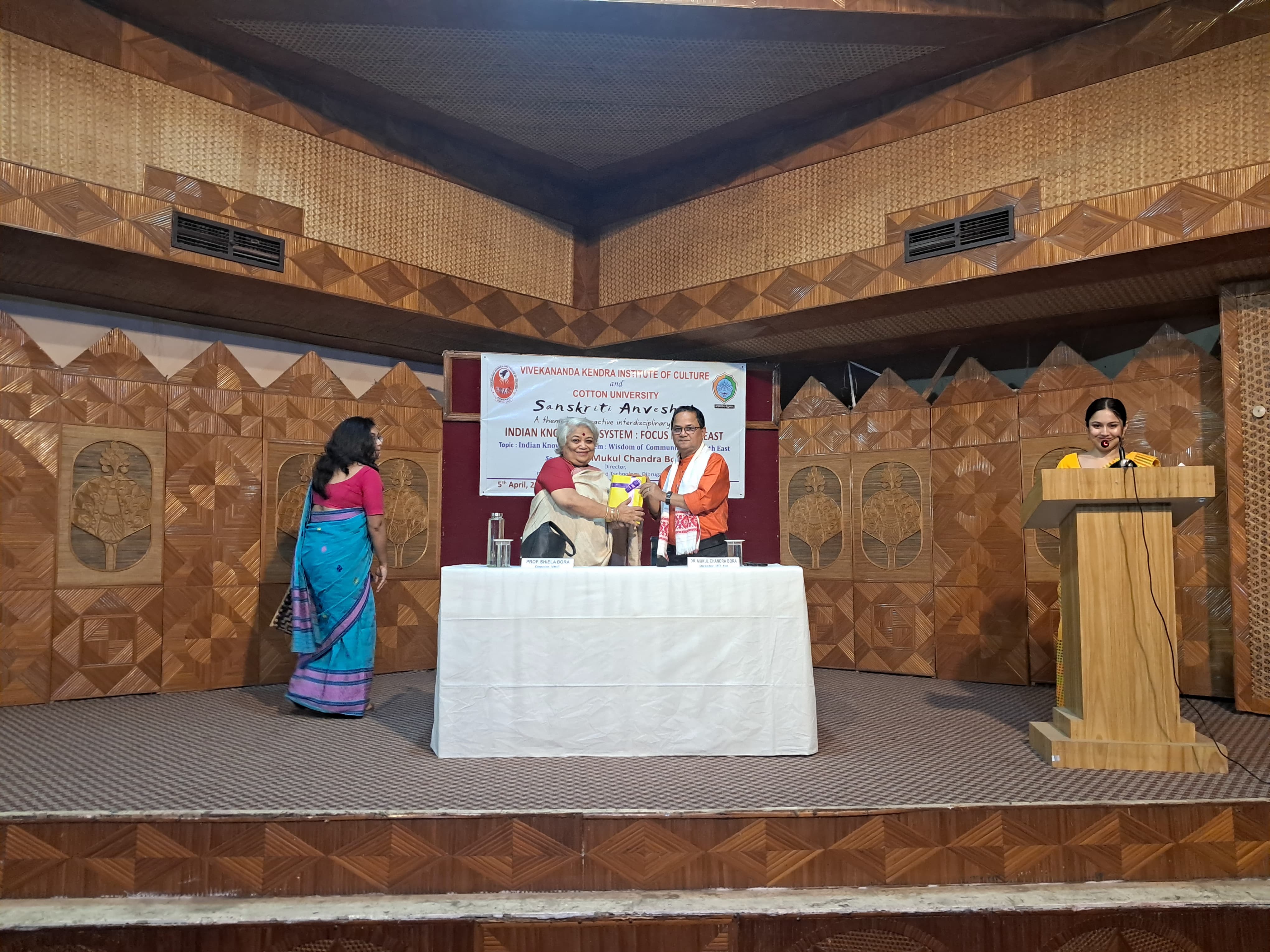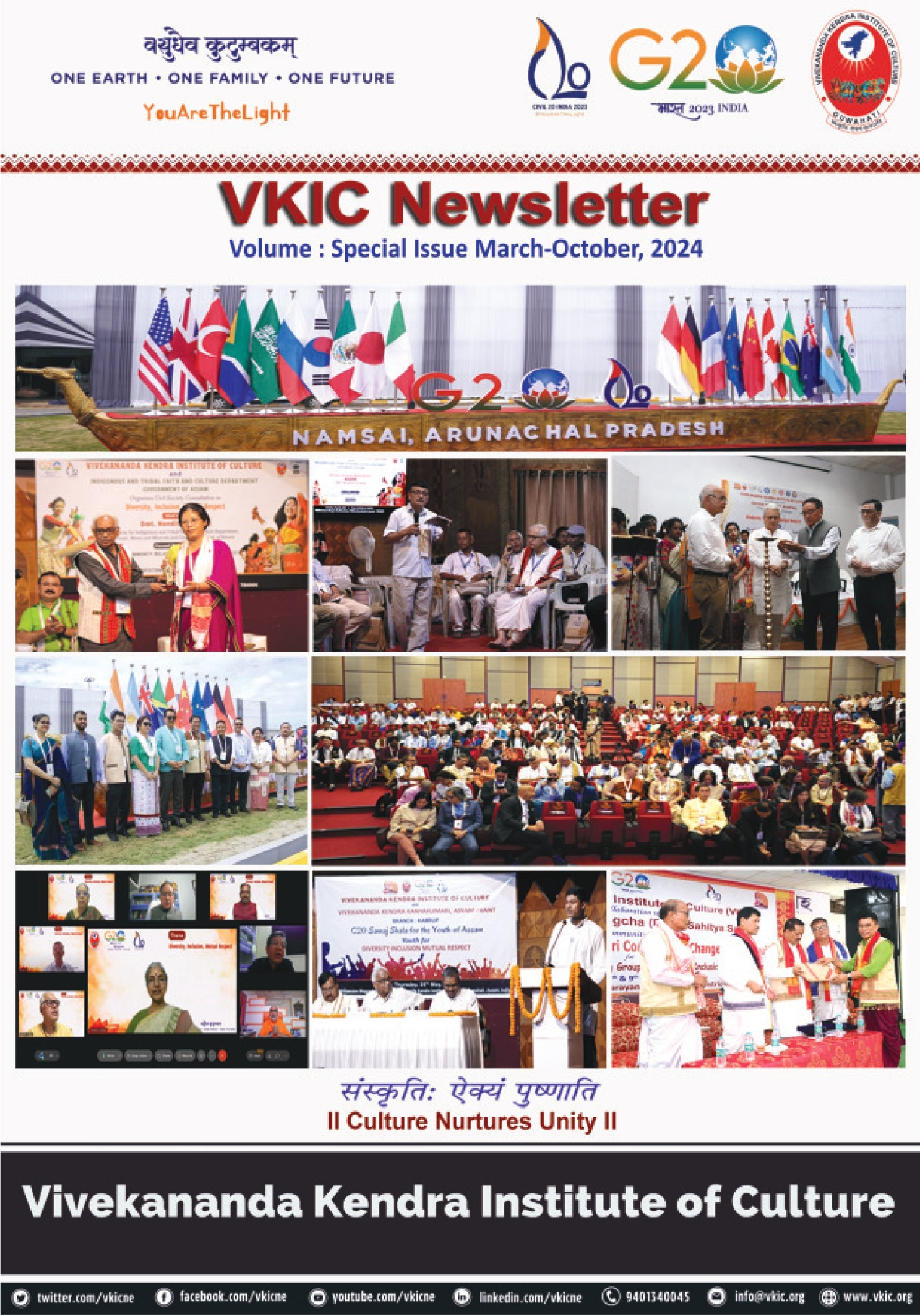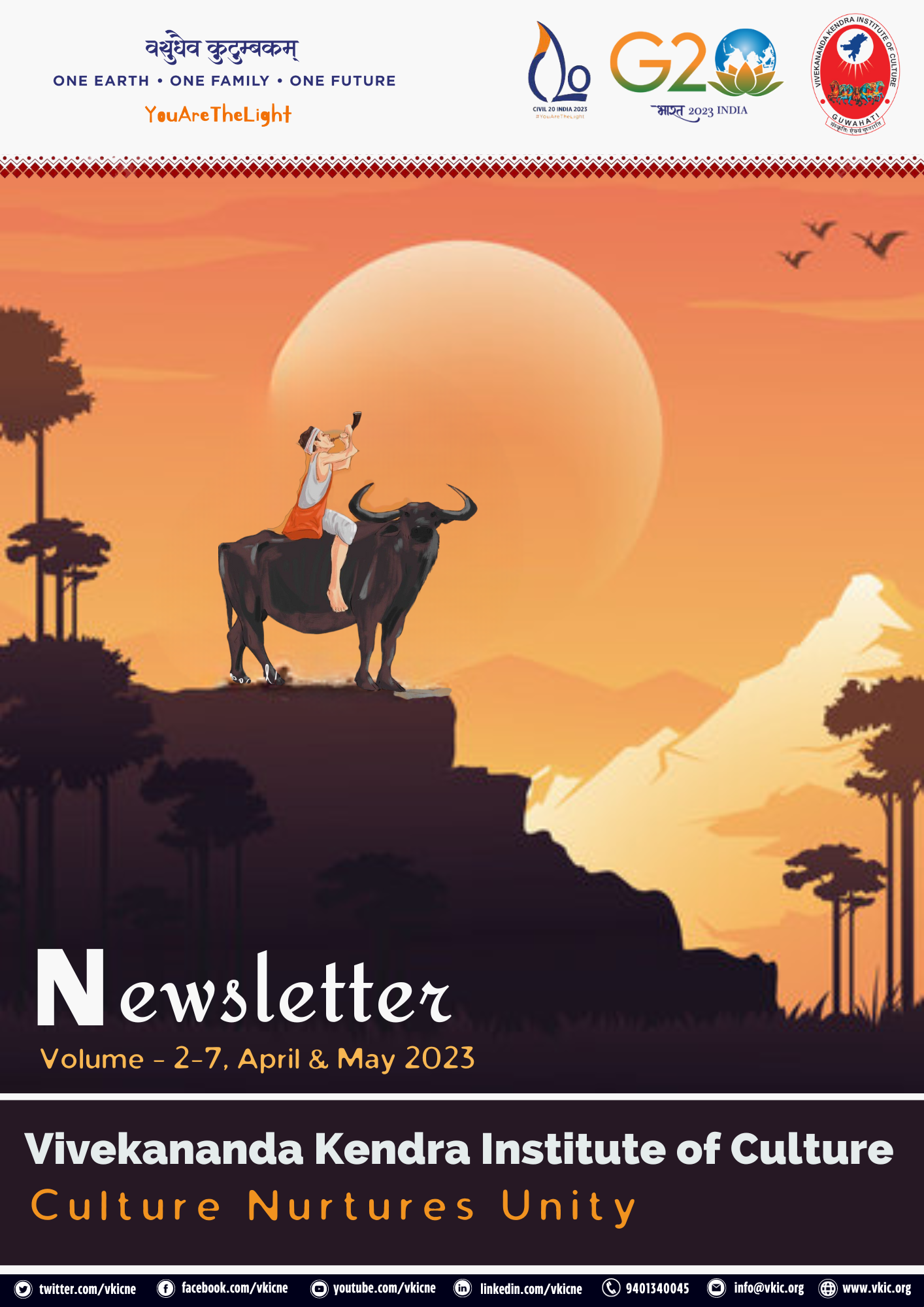
On 5th April 2025, Vivekananda Kendra Institute of Culture organized a thematic interaction under the banner Sanskriti Anveshak: A Thematic Interaction Interdisciplinary Forum. The event marked the initiation of a discussion series on the theme Indian Knowledge System: Focus on North East. Held at the Vivekananda Kendra Institute of Culture premises, the session witnessed the enthusiastic participation of 40 individuals, including members of Team Vivekananda Kendra Institute of Culture. Esteemed scholars Dr. Mukul Chandra Bora and Dr. Sheila Bora graced the occasion as speakers, sharing their insights and perspectives on the rich and diverse indigenous knowledge traditions of the North Eastern region of India. The session aimed to foster a deeper understanding and encourage further exploration of the Indian Knowledge System through an interdisciplinary lens.
Highlights of the Event:
- The event started with Mangalacharan by Natasha Saikia (JPA)
- Speaker Dr. Sheila Bora initiated the discussion, stating it is the first series of Sanskriti Anveshak on the Indian Knowledge System. Study of Traditional knowledge of North East has proved that various aspect of social life is integrated and it cannot be separated from each other and the incorporation of our culturally thoughts and values in policy decision and can only be find solutions for solving various problems we’re facing today.
- North East which lies between two very big ancient civilization (i.e. The Indian & Chinese) is a region contributing to Indian Knowledge System.
- The region is home to more than 200 ethnic tribal communities and each of them blessed with indigenous knowledge and had been passed down from one generation to other.
- The study of the cultures of Northeast India began in the first part of the 20th century. She also added that the study was done by Colombian Administrators, Anthropologies, Missionaries who came and study the region from an anthropological point of view and they stated or considered our culture as inferior in comparison to scientific development theories and they also written that our culture is very backward culture.
- They also make fun of us and every knowledge that we have, the tribal communities were completely ignored and the culture was replace by modern and western culture.
- The re-emergence of traditional culture in the form of indigenous knowledge system which justify to need to give privacy for the revival of our cultural ideology.
- In contrast to the past northeast is seen as knowledge societies.
- Tribal art & craft are now seen rich cultural heritage and the medicinal knowledge is seen as very importance.
- She also talks about the economic aspect of tribal societies. She stated that the in a tribal economic system their emphasis was never on profit maximization.
- Whatever we do, our well-known medicinal plant is disappearing because of the pharmaceutical companies comes and uproot the entire plant.
- Vernacular Architecture built with local materials adapted to local climate condition. Good connection with nature and using its resources.
Dr Mukul Chandra Bora Guest Speaker
- Indian knowledge system has been there since ages. It was started with the Rig Veda and spread throughout Bharat-Varsha.
- Indian knowledge system is a sum total of knowledges developed across whole world but basically developed by Hindu River.
- 64 Women Rishis who were equally taking part from Shruti to Rig Veda, and to all those ancient scriptures.
- Information which is received from reading books it is not knowledge, information is just like that uncooked material brought from market.
- 1835 Education policy, British does not like Bengali because of constant questionings.
- There were people who learned Sanskriti before coming to India.
- According to Rig Veda Cow is the first domesticated animal.
- Srimanta Sankardeva, Namghar while offering “Sarai” (Traditional Dish with a Stand) 7 Fruits should be given. However similar concept was prevailing in the west that 7 colour fruit should be taken.
- 80% people of China according to WHO takes traditional medicine, however 99.9% paracetamol medicines are imported to India.
- He also stated that, he got two books on medicine’s (original Persian book and the second copy which was translated by US scientist).
- Science is not that which is not be understood by common people, science is that which could be understood by common people.
- He also talked about the benefits of charcoal, as he mentioned that it is used as facial mask, which is made up of bamboo charcoal, and the biggest exporter of bamboo is south Korea because they know the benefits of charcoal and know about the indigenous knowledge has everything.
- We are not a developing country, we are under developing country because we don’t have a technology to manufacture needle.
- Highest proteins contained in pules.
- Agriculture was the first innovate process in India, that why agriculture was not regarded as industrial revolution.
- The essence of agriculture can be also found in ancient scriptures such as Rig Veda.
- “Agriculture was first formally introduced in the place called Bharat-Varsha” it is also known Rig Vedic farming techniques. (Regenerative Farming Techniques)
- There was concept know as cowboy economics (resource should be used in place if vanished go to another place), Robin Hood Economics (taking money from one person & giving to another person)
- Indigenous knowledge is a part of experiential learning.
- Our education system is now just like Bonsai tree, with its bark we cannot build house, it does not give us sufficient oxygen to breath etc.…
- Now we have finished all the free elements of the nature, soil has become poisonous due to which earthworms as now no longer be seen anywhere specially in farming land.
- Water & Air pollution increasing day by day.
- In 1932 Indian medical Association Journal had published an article Title “Mineral Waters in India” he also added that those water bodies which had mineral water properties have been completely polluted by industries.
- He also mentioned about water scarcity in cities of India and main cause of such disaster is none other than humans.
- Chinese economy built on indigenous Knowledge.
- Kautilya's Arthashastra was not a book, but it is a library.
- He concluded his speech by referencing to a book named “The Wonder of India” By AL Basham, which describes a survey of the culture on Indian history.
The event was ended with Shanti path & vote of thanks by secretary of VKIC.


